- Home
- J. Naomi Ay
Firestone Rings (The Two Moons of Rehnor, Book 4)
Firestone Rings (The Two Moons of Rehnor, Book 4) Read online
The Two Moons of Rehnor
Book 4
Firestone Rings
By
J. Naomi Ay
Published by Ayzenberg, Inc.
Copyright 2012- 2016 Ayzenberg, Inc.
All Rights Reserved
100116
Cover Design by Robert W. Cabell
Also by
J. Naomi Ay
The Two Moons of Rehnor Series
The Boy who Lit up the Sky, Book 1
My Enemy’s Son, Book 2
Of Blood and Angels, Book 3
Firestone Rings, Book 4
The Days of the Golden Moons, Book 5
Golden's Quest, Book 6
Metamorphosis, Book 7
The Choice, Book 8
Treasure Hunt, Book 9
Space Chase, Book 10
Imperial Masquerade, Book 11
Rivalry, Book 12
Thirteen, Book 13
Betrayal, Book 14
Fairy Tales, Book 15
Gone for a Spin, Book 16
The Firesetter Series
A Thread of Time
Amyr’s Command
Three Kings
Exceeding Expectations
Table of Contents
Chapter 1 – Sorkan
Chapter 2 – Taner
Chapter 3 – Katie
Chapter 4 – Tilia
Chapter 5 – Katie
Chapter 6 – Moira
Chapter 7 - Katie
Chapter 8 – Shika
Chapter 9 – Shelly
Chapter 10 – Katie
Chapter 11 – Tilia
Chapter 12 - Taner
Chapter 13 – Meri
Chapter 14 – Moira
Chapter 15 – Taner
Chapter 16 – Shika
Chapter 17 – Taner
Chapter 18 – Sorkan
Chapter 19 – Taner
Chapter 20 – Rekah
Chapter 21 – Shelly
Chapter 22 – Shika
Chapter 23 – Sorkan
Chapter 24 – Caroline
Chapter 25 – Katie
Chapter 26 – Caroline
Chapter 27 – Taner
Chapter 28 – Tilia
Chapter 1
Sorkan
“We need to wait a little longer,” I said.
My nephew Rekah nodded. He and I, our cousins and the chiefs of our people were waiting in the Temple.
“It is nearly sunset.” My cousin, the Chief of Shrotru prodded me. “We cannot wait much more.”
“He will be here,” I replied, my voice perhaps a little sharper than necessary. I was grieving so my rudeness should have been forgiven.
I was sober today. I was forever sober now. My tongue had soured on the taste of drink, and I was ashamed it had controlled me for so long. Every day I knelt in the Temple and asked Him for forgiveness and begged for His Blessing once again. Every day of my father’s illness, I sat by his bedside and asked for forgiveness from him, too. My father gave me his blessing. I did not know yet if My Lord had done so.
“My father is greeting Grandfather in the Heavens,” my nephew said, tears staining his face.
“Your father is not dead,” I snapped. “Your father chooses to be gone from this valley for more than twenty years. Say a prayer for your Grandfather’s peace and another that your father will soon return home to honor his obligations.”
My nephew knelt in obeisance, and his mouth moved as he recited the ancient words without sound. His weeping annoyed me. A man as large and strong as he, a man with three wives and already too many children to count should not need to cry as an infant over the death of a man who had seen nearly one hundred years and could not leave his bed for all of the last one.
My stomach clenched at this thought. My father could have lived another twenty years, had he wished. My father had no need to lie in bed and let the cancers within him eat away at his body. My son could have cured him, but my father refused. My father had brought on this day, this time, upon himself. He was dead, and I had to remain here and continue on in his absence whilst my sole remaining brother flitted off in the galaxy doing heaven knew what.
The sun had set over the Blue Mountains, coloring the rigid peaks in shades of orange and red. The heat of the day was gone, and a cool, bitter wind drifted through the open doors of the Temple. The flame in the Eternal Light flickered and for a moment taunted us, threatening to extinguish.
“We must begin,” my cousin the High Priest declared. “It is time. We cannot delay.”
I nodded. It was late. We could not delay past sundown. My son had chosen to disrespect his ancestors and our customs through his absence. My stomach churned again. My father had abandoned me and left me alone to deal with this arrogant, stubborn, supercilious son who would now rule us all.
Footsteps ran across the stones outside the Temple, becoming silent as he entered the chapel, his bare feet padding against the smooth marble floors.
“Sorry,” my son whispered, kneeling down between me and my nephew.
“At the last possible moment,” I replied scornfully, although in truth, I was much relieved at his arrival.
“Bit of a long trek from Rozari.”
“You know how that may be resolved.” I turned my attention to my cousin for the last thing my son wished to hear was a demand for him to return to this Rehnor permanently.
The High Priest chanted the prayers of mourning, and we joined him. Despite my irritation, it was a comfort to say the words that had been said for millennia by our ancestors when they were similarly bereaved. It soothed my heart because I loved my father and I wished him peace in the afterlife. I would miss him greatly.
The sun had fully set, and it was dark by the time that we arose from our prayers. The chiefs of our people come forward, and they made obeisance before my son who was now their king and soon would be king of the Mishnese people, too. My son was all but king in name now for he decided everything for Mishnah. The old king, my father-in-law, was ailing and had been befuddled in his head for some time. I glanced askance at my son, and because the drink was no longer staining my thoughts, my heart filled with pride although still I was irritated at his late arrival.
Six of our highest chiefs and cousins stood before the casket and made ready to carry it to the burial ground. The others carried torches. The three of us followed the casket, my nephew and I on either side of my son. Our procession paraded slowly through the village, through the silence.
The women and the children, the warriors and old men were all on their knees. As we passed, they rose and followed us. I saw the MaKani and the little prince, Shika, on the steps of my father’s house, which was now my nephew’s home. Rekah’s first wife, Letitia and eldest son, Tuman stood next to them. Rekah’s other wives, Carina and Seesi, stood behind them. The women came down the steps together and followed us, the two little boys regarding each other warily. We processed all the way to the high mounds of the steppes and the casket was laid in the ground above the village. My father would lie next to his father and his father before him. My father's sons and my brothers, Lot and Pedah would lie at his feet.
Our cousin, the High Priest, chanted more of the ancient words. Then he spoke of the wars. He named the de Kudisha princes and all the men of Karupatani who lay beneath the soil we stood upon, who gave their blood and their life spirit for this Rehnor and before that, Rozari, the motherland. He spoke of my noble father who lost three sons to the wars but still knew there could be peace. Merakoma, my father humbled himself before the Mishnese king and gave our most precious commodity, the seed of a de Kudisha Prince
to the Mishnese because he knew it was the only way to make peace.
Unbidden, tears came to my eyes for it was I that provided this seed and my little Mishak Princess who did nurture it. I missed her even now. Perhaps it was because she had been taken from me after so brief a time together that I still longed for her. Had we been married instead for these forty odd years, perhaps she would be but a cold stone in my heart, a heavy ball affixed to my ankle by a chain.
I glanced at my son, our son, but his face revealed nothing in the dim light of a flickering torch.
The High Priest closed his prayers and made obeisance at the feet of my son. He gave our new king the Firestone ring worn by my father and my son slipped it on the fourth finger of his right hand. Then he knelt down and took a handful of dirt, tossing it in the open grave. My nephew and I did the same. We left together although my son paused before the grave of my brother Pedah. He bent down and placed a shiny silver stone upon the headstone. This silver stone glowed with a light that came from deep within it. My son smiled at this. The stone flickered and for many years after, my brother’s grave was always alight.
“What is it?” I whispered to my nephew as we walked back to the village, guided by the torches held by our chiefs.
“I don't know,” Rekah replied. “How would I know such a thing?” He wiped at his tear stained cheeks.
“It is fermium,” my son said. “Pedah and I once argued about this metal and whether or not it contained a combustible energy. As you can see, it does, and because of it, Rehnor will become…”
“What?” I asked as his voice went quiet. “What will Rehnor become?”
“It doesn’t matter now.” He shook his head.
“We will begin early, at sunrise, Sir,” Rekah told the King. We were at my son’s little house behind the village, hidden in the trees.
“That's fine, Rekah,” he replied distractedly, his mind still pondering fermium or whatever it was that Rehnor would become.
My son sat down on the steps of his porch and lit a cigarette. I sat down across from him and Rekah stood, leaning against the rail. We waited for the women and children, sitting in silence. I had words I considered sharing with my son, advice I might have offered him but decided against it. Throughout his entire life, we had exchanged but a handful of words and none of them civil. I was never a father to him nor a king. What value could he have possibly placed on my thoughts?
Presently, the women came along. They too were silent, like ghosts in the dark. My brother’s wife, Garinka was with them. The Human carried my grandson, his head lay sleeping upon her shoulder. I stood and held out my arms, asking her in Mishnese if she would let me hold him. She smiled and passed to me the child. I held him against my chest, stroking his soft baby fine hair. There was something of the Mishnese Princess in him. Perhaps, it was only his innocence. There was something, too, in the Human that reminded me of my wife although they were born in different times on planets light years away from one another.
The Human’s face softened as she watched me hold her baby. She put her hand on my arm. I bent down and kissed her on both cheeks.
“My beautiful daughter,” I said in Karupatani though she did not understand my words. “I thank you.” Undeniably, I was a terrible father, and worse as a son. Perhaps now, I might redeem myself as a grandfather.
“Tell her I will be here before sunrise.” The shrill voice of my brother’s wife announced, disturbing the quiet, contemplative air of the night. “Tell her I will show her how to prepare.”
“Tell her yourself.” I kissed the top of my grandson’s sleeping head. “She does not understand either of us.”
“You speak Mishnese,” Garinka turned to Rekah, her son. “Tell her I have made a dress for her and the little one may wear your Tuman's old leggings and vests.”
“She doesn't speak Mishnese,” Rekah replied. “I cannot tell her any of this.”
“Why does she not speak Mishnese?” Garinka demanded.
“She lives on Rozari,” I said softly above my grandson’s head. “They speak Rozarian.”
“She is Rozarian? I thought she was from another place. I did not know she was Rozarian.”
“She is not Rozarian,” Rekah declared. “She is from Earth. She is called a Human.” My nephew pronounced the word as if it were the name of the most succulent berry, the most beautiful woman. I glanced up to see his eyes intent on the lady, his face soft.
“What is that?” My brother’s wife persisted. “Is the baby that, too? He looks to be Mishnese. He looks like a Kalila. He looks like your wife.” She glared at me and spat on the dirt.
“He does a little,” I agreed, still stroking my sleepy grandson’s head and watching my nephew’s gaze with curiosity. “But he also looks like a de Kudisha. He looks like me.”
“He has her eyes,” Garinka said. “Her coloring. He looks Mishnese.”
“She is not Mishnese, Mother.” My nephew finally turned his eyes away, glancing with disappointment at his own beautiful wives.
“She's not?” Garinka furrowed her brow with puzzlement. “Oh yes, you said that. She is from Rozari.”
“She is not,” Rekah sighed.
My son finished his cigarette and rising to his feet, put a proprietary hand upon his wife’s shoulder.
“Bring the baby in the house, Sorkan,” my son commanded me. “And my wife does speak Mishnese.”
“She does?” Garinka cried as I followed them into their house and put the boy to bed in his room up the stairs. Rekah called to his wives to return to their own house.
“Tell her I will be here before sunrise!” Garinka yelled through the open door.
“I will,” I sighed and wondered if I might not just sit here in this room and gaze at my sleeping grandson all night long.
I was wakened before dawn by the voice of my sister-in-law. “What are you doing there?” She cried from the upstairs. I pulled myself off the couch where I had lain throughout the night. The baby had awakened also, and I could hear his crying.
“Mommy, Mommy!” He called from his room. I climbed the stair and went to fetch him as Garinka’s body blocked the door to my own son’s room.
“You do not need to sleep with him anymore,” she declared. “There are plenty in the village who would service him for you. It is not right for the Queen to share the King’s bed.”
“Garinka, you are annoying and not welcome here,” my son replied gruffly. “Get on with you.”
I entered the baby’s room to find him sitting in his bed clutching a fuzzy, stuffed creature with a bottle shaped body and long nose.
“Come.” I made to pick him up.
“Who are you?” He shrank away from me and held the creature tighter. “Nordy doesn’t like you.”
“I am your grandpa. Come with me. I will take you to your mommy.”
The boy cocked his head to the side and studied me. He held up the creature called Nordy and nodded its head.
“Nordy says you’re not Grandpa Manny.”
“No, I am not. I am Grandpa Sorkan. Shall we go see what your Auntie Garinka is creating such a fuss about at this early hour?”
The child turned the Nordy’s face to his as if to consult with it. “Okay,” he agreed after a moment and climbed from his bed. He took my hand, and we walked across the hall to where my sister-in-law stood arguing with my son.
“It is unseemly,” she said, her hands planted firmly on her substantial hips. “And don’t you argue with me, Senya. I, who have practically raised you in my own house as my own son and know you better than any other.”
“Garinka,” my son sighed and pulled his blanket over his head. My daughter lay next to him, her face bright red, clutching the blanket as my grandson clutched his Nordy.
“Tell them,” Garinka cried, now turning on me. “Tell them it is time to get up and prepare and tell them it is not right that they share a bed in this village. Look, the baby is here! He should not see this.”
“Mommy!” My gran
dson cried and released my hand to race across the room and climb into the bed, as well. He lodged himself between his parents, defiantly holding his Nordy out before him.
“Would you all please leave!” The Human yelled. “And for your information, Garinka, I don’t care if it’s unseemly. I need him to service me!”
My son burst out laughing. The child smiled and laughed too though it was obvious he had no understanding as to why. Garinka glared at me as if this were solely my fault.
“Senya,” I groaned. “It really is time to arise and prepare. Come now. We will leave you alone for a few moments to dress.” Senya irritably tossed the blankets aside and threw his feet upon the floor.
“I shall never understand,” he said crossly, plodding his way to the bath in all his naked glory. “Why I require so much time to dress when only to undress when I arrive there.”
“Come, lady,” Garinka called, her eyes riveted upon my son, her voice suddenly high and sweet. “Let us prepare you as well.”
“I will go downstairs and start coffee,” I announced and pulled my sister-in-law along with me. “Let them be, Garinka. I am certain she does not need your assistance to put on a robe.”
By the time the sun arose, we were at the Temple for the ritual ceremony. The Mishaks held coronations and declarations of fealty to their kings, calling upon their Saint for blessings, whereas, we marked up our kings and made them bleed before us, calling upon them to declare their fealty to us. I wasn’t certain which way was more civilized.
Before the chiefs of our people, our princes and priests, my nephew stood before my son and marked his arm in the way of a king. Rekah’s hands shook and he cut in too many places and there was much blood. Our cousins seared the skin which stopped the bleeding, but the smell of burnt flesh made my stomach sour. My son turned very pale, and his eyes were grey and with little light, but he was awake throughout, which I know I could not have been should I have been so misfortunate as to be crowned king in his stead.

_preview.jpg) The Boy who Lit up the Sky (The Two Moons of Rehnor, Book 1)
The Boy who Lit up the Sky (The Two Moons of Rehnor, Book 1)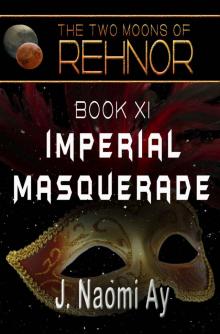 Imperial Masquerade (The Two Moons of Rehnor, Book 11)
Imperial Masquerade (The Two Moons of Rehnor, Book 11)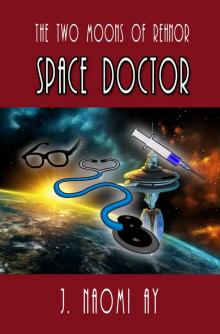 Space Doctor (The Two Moons of Rehnor)
Space Doctor (The Two Moons of Rehnor)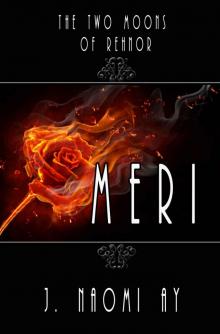 Meri (The Two Moons of Rehnor)
Meri (The Two Moons of Rehnor)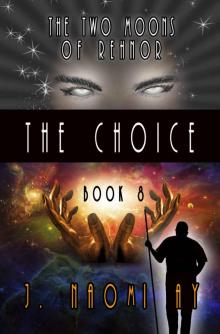 The Choice (The Two Moons of Rehnor, Book 8)
The Choice (The Two Moons of Rehnor, Book 8) Gone for a Spin (The Two Moons of Rehnor, Book 16)
Gone for a Spin (The Two Moons of Rehnor, Book 16)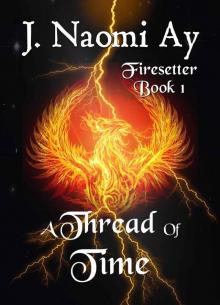 A Thread of Time: Firesetter, Book 1
A Thread of Time: Firesetter, Book 1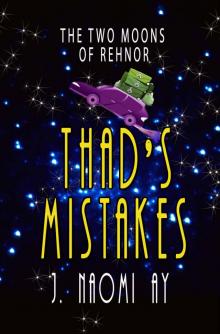 Thad's Mistakes (The Two Moons of Rehnor)
Thad's Mistakes (The Two Moons of Rehnor)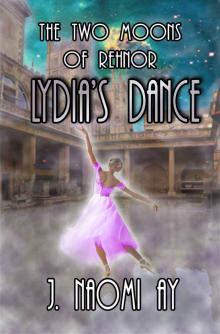 Lydia's Dance (The Two Moons of Rehnor)
Lydia's Dance (The Two Moons of Rehnor)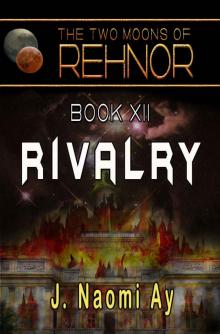 Rivalry (The Two Moons of Rehnor, Book 12)
Rivalry (The Two Moons of Rehnor, Book 12)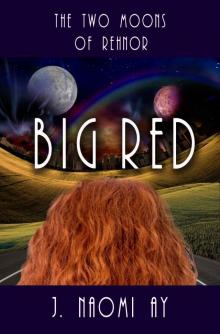 Big Red (The Two Moons of Rehnor)
Big Red (The Two Moons of Rehnor) Shrotru: Departure Episode 2 (Journey to Rehnor)
Shrotru: Departure Episode 2 (Journey to Rehnor) Space Chase (The Two Moons of Rehnor, Book 10)
Space Chase (The Two Moons of Rehnor, Book 10)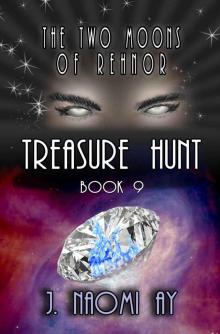 Treasure Hunt (The Two Moons of Rehnor, Book 9)
Treasure Hunt (The Two Moons of Rehnor, Book 9)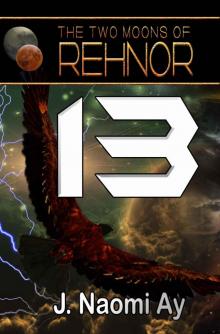 Thirteen (The Two Moons of Rehnor, Book 13)
Thirteen (The Two Moons of Rehnor, Book 13)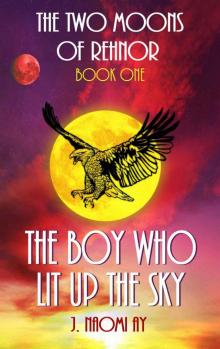 The Boy who Lit up the Sky (The Two Moons of Rehnor)
The Boy who Lit up the Sky (The Two Moons of Rehnor)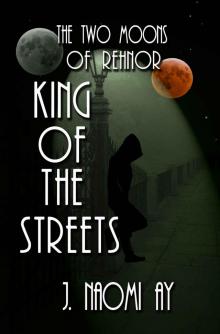 King of the Streets (The Two Moons of Rehnor)
King of the Streets (The Two Moons of Rehnor)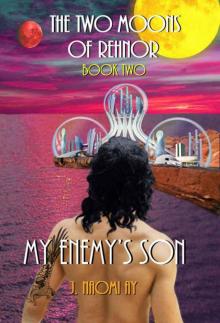 My Enemy's Son (The Two Moons of Rehnor, Book 2)
My Enemy's Son (The Two Moons of Rehnor, Book 2)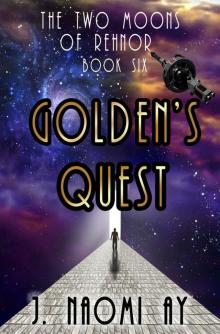 Golden's Quest (The Two Moons of Rehnor, Book 6)
Golden's Quest (The Two Moons of Rehnor, Book 6) Mike v2.0 (A Firesetter Short Story)
Mike v2.0 (A Firesetter Short Story)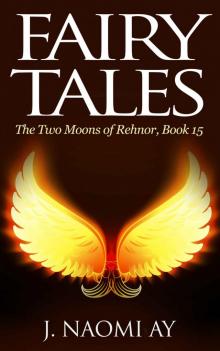 Fairy Tales (The Two Moons of Rehnor, Book 15)
Fairy Tales (The Two Moons of Rehnor, Book 15) The Days of the Golden Moons (The Two Moons of Rehnor, Book 5)
The Days of the Golden Moons (The Two Moons of Rehnor, Book 5)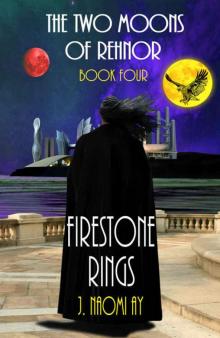 Firestone Rings (The Two Moons of Rehnor, Book 4)
Firestone Rings (The Two Moons of Rehnor, Book 4) Kudisha Departure Episode 1 Journey to Rehnor series
Kudisha Departure Episode 1 Journey to Rehnor series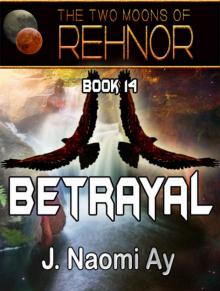 Betrayal (The Two Moons of Rehnor, Book 14)
Betrayal (The Two Moons of Rehnor, Book 14)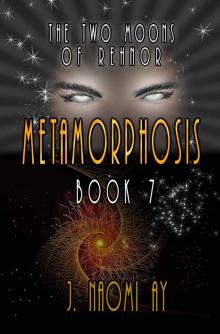 Metamorphosis (The Two Moons of Rehnor, Book 7)
Metamorphosis (The Two Moons of Rehnor, Book 7) Diridan's Daughter (The Two Moons of Rehnor)
Diridan's Daughter (The Two Moons of Rehnor)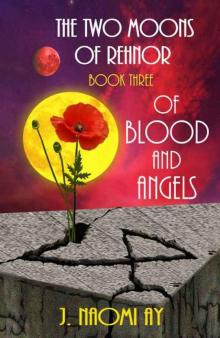 Of Blood and Angels (The Two Moons of Rehnor, Book 3)
Of Blood and Angels (The Two Moons of Rehnor, Book 3)